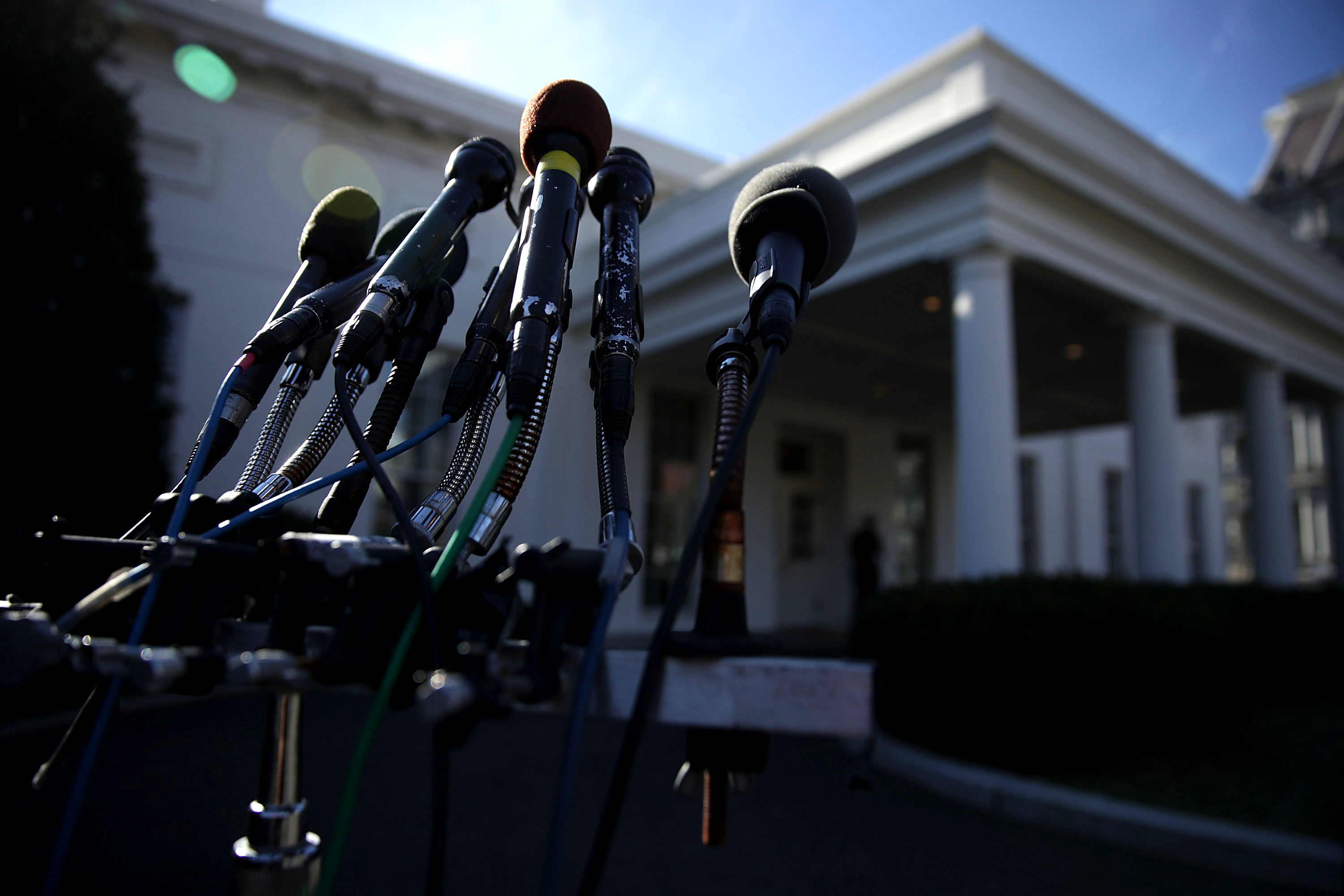The servile D.C. media
Why "savvy" journalists slavishly excuse political corruption


President Trump's personal lawyer Michael Cohen got what are essentially huge bribes from corporations including AT&T and Novartis, as well as a firm tied closely to a Russian billionaire named Viktor Vekselberg, it was revealed this week. The expectation clearly was that if Cohen got his cut, then he would help these powerhouses obtain political favors from the Trump administration. AT&T and Novartis have both offered public apologies of sorts, and said they had basically been conned. Meanwhile, Cohen personally collected something like $1.8 million out of a shell company — which, it turns out, was the same one he used to pay hush money to Stormy Daniels.
Looks bad! But not to worry, the savvy Washington media is on the case.
In Politico's Playbook newsletter, Jake Sherman, Anna Palmer, and Daniel Lippman sneer at everyone who was gobsmacked at Cohen taking straight-up bribes ("Newsflash: $1.2 million is not even a rounding error for massive corporations"), or Paul Ryan flying to collect $30 million in campaign cash from billionaire Sheldon Adelson. ("That's how campaign finance works … Happens routinely in both parties.")
The Week
Escape your echo chamber. Get the facts behind the news, plus analysis from multiple perspectives.

Sign up for The Week's Free Newsletters
From our morning news briefing to a weekly Good News Newsletter, get the best of The Week delivered directly to your inbox.
From our morning news briefing to a weekly Good News Newsletter, get the best of The Week delivered directly to your inbox.
There is a basic problem with centrist nonpartisan political journalism: According to the internal ideology of the profession, reporters aren't supposed to make ideological statements, because that would not be "objective." On about 30 seconds' philosophical consideration, one discovers that it is virtually impossible to say anything about politics without making some kind of normative statement. Objectivity in reporting is a priori impossible.
However, long ago political reporters discovered a clever way around this problem: what journalism professor Jay Rosen calls the "savvy style" of reporting. This type of journalist doesn't make explicit ideological statements or normative judgments about politics; rather, he just comments about political effectiveness. Instead of saying whether it's good or bad to annex the Sudetenland or whatever, he pronounces how that move is playing politically, whether or not it is "working."
Of course, the savvy style has its own hidden ideology, as it must. As Rosen writes, by framing discussion within the boundaries of perceived status quo politics, it helplessly legitimizes that status quo, and tends to inculcate a corrosive cynicism: "In politics, they believe, it's better to be savvy than it is to be honest or correct on the facts. It's better to be savvy than it is to be just, good, fair, decent, strictly lawful, civilized, sincere, or humane."
Despite adding a brief disclaimer that "we're not defending the status quo," that is absolutely what Sherman et al are doing — and in this case, a status quo of naked bribery and corruption, in which huge cash payments are literally traded for promises of political favors. In one incredible passage, they frankly admit that many Playbook readers — and by extension, Playbook itself, which commands high ad rates due to its elite readership — are reliant on Cohen-style bribery schemes, and literally include a tip for how to disguise payoff money:
A free daily email with the biggest news stories of the day – and the best features from TheWeek.com
YES, guys like Michael Cohen routinely get paid amounts like $1.2 million to offer insights about their boss or former boss. Yeah, it's crazy. But many readers of this newsletter would not have their McMansion in McLean, their BMW, their membership at Army Navy, second homes in Delaware, cigar lockers and endless glasses of Pinot Noir at BLT Steak and Tosca if that kind of stuff didn't happen. Newsflash: $1.2 million is not even a rounding error for massive corporations. (The smart companies route these deals through law firms.) [Politico]
Focused as they are on performative savviness instead of legal analysis, they also drastically underrate the possibility that such payments may run afoul of the remaining shreds of anti-corruption law. While the conservative Supreme Court majority has deliberately made it almost impossible to prosecute public corruption cases (to protect a major method of doing conservative politics), it remains highly illegal to take political bribes.
It's also worth mentioning that the formal business model of Playbook itself has historically borne quite a close resemblance to Cohen's method here. Back when founder Mike Allen was running it (he has since moved on to Axios), he would run very pricey ads from corporate clients, and then later mysteriously publish "adoring" coverage of those clients in his own voice. Needless to say, that is not how ordinary journalism is conducted.
Corruption, status quo bias, and incoherent ideology aside, it's important to also emphasize that this style of reporting doesn't even work on its own terms. Condescending cynicism is not a particularly reliable way of understanding horse race politics, and routinely fails spectacularly. Savvy journalists spent the whole last election cycle confidently predicting Trump could not win, doing things like laughing in Keith Ellison's face when he suggested in mid-2015 that Trump might win the Republican nomination. If anything, they're even more out of touch than the typical journalist is.
There are plenty of good reporters in Washington, D.C. But this style of journalism — the signature method in the nation's capital — is worse than worthless. It is morally rotten.
Ryan Cooper is a national correspondent at TheWeek.com. His work has appeared in the Washington Monthly, The New Republic, and the Washington Post.
-
 What will the US economy look like in 2026?
What will the US economy look like in 2026?Today’s Big Question Wall Street is bullish, but uncertain
-
 Alaa Abd el-Fattah: should Egyptian dissident be stripped of UK citizenship?
Alaa Abd el-Fattah: should Egyptian dissident be stripped of UK citizenship?Today's Big Question Resurfaced social media posts appear to show the democracy activist calling for the killing of Zionists and police
-
 Biggest political break-ups and make-ups of 2025
Biggest political break-ups and make-ups of 2025The Explainer From Trump and Musk to the UK and the EU, Christmas wouldn’t be Christmas without a round-up of the year’s relationship drama
-
 Bari Weiss’ ‘60 Minutes’ scandal is about more than one report
Bari Weiss’ ‘60 Minutes’ scandal is about more than one reportIN THE SPOTLIGHT By blocking an approved segment on a controversial prison holding US deportees in El Salvador, the editor-in-chief of CBS News has become the main story
-
 Has Zohran Mamdani shown the Democrats how to win again?
Has Zohran Mamdani shown the Democrats how to win again?Today’s Big Question New York City mayoral election touted as victory for left-wing populists but moderate centrist wins elsewhere present more complex path for Democratic Party
-
 Millions turn out for anti-Trump ‘No Kings’ rallies
Millions turn out for anti-Trump ‘No Kings’ ralliesSpeed Read An estimated 7 million people participated, 2 million more than at the first ‘No Kings’ protest in June
-
 Ghislaine Maxwell: angling for a Trump pardon
Ghislaine Maxwell: angling for a Trump pardonTalking Point Convicted sex trafficker's testimony could shed new light on president's links to Jeffrey Epstein
-
 The last words and final moments of 40 presidents
The last words and final moments of 40 presidentsThe Explainer Some are eloquent quotes worthy of the holders of the highest office in the nation, and others... aren't
-
 The JFK files: the truth at last?
The JFK files: the truth at last?In The Spotlight More than 64,000 previously classified documents relating the 1963 assassination of John F. Kennedy have been released by the Trump administration
-
 'Seriously, not literally': how should the world take Donald Trump?
'Seriously, not literally': how should the world take Donald Trump?Today's big question White House rhetoric and reality look likely to become increasingly blurred
-
 Will Trump's 'madman' strategy pay off?
Will Trump's 'madman' strategy pay off?Today's Big Question Incoming US president likes to seem unpredictable but, this time round, world leaders could be wise to his playbook
